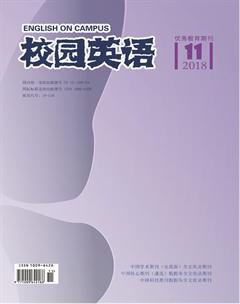A Pragmatic Analysis of Presupposition in Perfume Advertisements
张盛捷
【Abstract】Advertisement is ubiquitous and it plays a crucial role as a special form of communication in peoples daily life. By means of the advertising language, advertisers aim to persuade them to take purchasing actions. Besides, pragmatic presupposition is adopted widely by advertisers as an effective linguistic device to convey the implied information to consumers and to exaggerate the persuasive effect of the advertising language. Chanel No.5 as the most potent symbol of the luxurious simplicity for which Chanel is renowned. Therefore, I am going to analyse presupposition in Chanel No.5 perfume advertising language from the pragmatic perspective, trying to explain why pragmatic presupposition is adopted by the advertisers and elaborate the functions of pragmatic presupposition in perfume advertising language.
【Key words】pragmatic presupposition; perfume advertisements
Yule(2000) proposes to study presupposition in communication. According to him, it is not the simple words and phrases but the assumptions made by the speakers that carry presupposition. Through reading magazines and searching websites, the author collects some data about Chanel No.5 perfume advertisements. The author finds that as for the pragmatic presupposition adopted in the collected data, the Chanel No.5 perfume advertisers have a preference for factive presupposition. Factive presupposition is adopted to ensure the reliability of the advertised information, based on customers psychological tendency.
Here are some examples:
Example 1
I wear nothing but a few drops of Chanel No.5.
- Marilyn Monroe-Chanel No.5
In the 1950s the glamour of Chanel No. 5 was reignited by the celebrity of Marilyn Monroe. Monroes unsolicited endorsement of the fragrance provided invaluable publicity. In a 1954 interview, when asked what she wore to bed, the movie star provocatively responded: “Just a few drops of Chanel No. 5.” This advertisement is a typical kind of factive presupposition and presupposes the fact that the perfume is as essential as the life necessity, pyjamas. The advertisers put forward this presupposition by presenting Marilyn Monroes subjective assertion. Whether the assertion is true or not, it plays a vital role in the context. That is to say, the perfume plays an important role in ones fashion sense and personal charisma, just like ones necessities.
Example 2
Every woman alive wants Chanel No. 5.
- Vogue and Bazaar-Chanel No.5
The above example is a kind of factive presupposition, and it states the fact implicitly that every woman alive wants Chanel No. 5. In the 1960s the glossy fashion magazines such as Vogue and Bazaar presented Chanel No. 5 as a required accessory to every womans femininity. The target customers of Chanel No.5 are women who are longing for a better self and tend to purchase something that will polish and beautify their lives. By adopting factive presupposition, the advertiser conveys his firm belief of the perfumes attraction and his strong passion for the perfumes magical power. The small technique successfully arouses customers interests and expectation towards the perfume. If you have this new perfume, you just grasp a chance for holding what others desire to own, which can improve customers sense of superiority over other people. Therefore, this presupposition impacts on customers choice.
Example 3
Has she forgotten? I know I will not. Her kiss, her smile, her perfume.
-Rodrigo Santoro-Chanel No.5
This advertisement appears in a two-minute ad starring Nicole Kidman and Rodrigo Santoro. Nicole Kidman runs away in a pink dress in the middle of Times Square in New York City, only to get into a cab with the one man who does not know who she is. Later on, Rodrigo Santoro says that has she forgotten? He knows he will not forget her kiss, her smile and her perfume. This is also a piece of factive presupposition presented by Rodrigo Santoro who points out that he will never forget the fragrance which can indicate how charming and unforgettable Chanel No.5 is and how memorable the experience about Chanel No.5 is. This advertisement presupposes that the memory connected with the unknown woman will be aroused by the smell, by the fragrance, by Chanel No.5.
To sum up, a effective presupposition in advertisement can make customers attracted by the product and can avoid repugnance at the same time. Pragmatic presupposition is a popular way for advertisers to convey persuasive information concisely, effectively and implicitly. Perfume advertisers can make full use of all kinds of pragmatic presupposition based on different style of the advertised perfume and different targeted customers to achieve their persuasive goals effectively.

